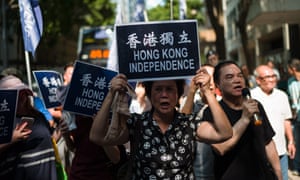Source: The Guardian (9/23/18)
Hong Kong bans pro-independence party as China tightens grip
Hong Kong National Party banned in the interests of ‘national safety’
Bu Lily Kuo

Pro-democracy activists march against a proposal to ban the pro-independence Hong Kong National Party in July Photograph: Jérôme Favre/EPA
In an unprecedented move, Hong Kong has banned a pro-independence political party, causing outcry among critics who see the measure as another sign of the China’s tightening grip over the city.
On Monday, Hong Kong’s security bureau announced it had upheld a police request to ban the Hong Kong National Party (HKNP), a well-known but small group that promotes the city’s independence from China.
“I hereby order that the operation or continued operation of the Hong Kong National Party in Hong Kong to be prohibited,” a notice from the security minister said on a government website.
It is the first time since Hong Kong was handed back to China by Britain 21 years ago that a political party has been banned. Under the terms of the handover, semi-autonomous Hong Kong is meant to enjoy freedoms unseen on the mainland, including freedom of expression, association, and elections.
However, the space for political dissent has shrunk in the face of an increasingly assertive China under President Xi Jinping. Beijing resists any challenges to its sovereignty in Hong Kong.
In July, police recommended a ban on HKNP under the Societies Ordinance, which stipulates groups can be prohibited on the basis of national security and public safety. Security authorities said the party had not used any violence but posed a “real threat to national security”.
On Monday, HKNP leader Andy Chan said he was waiting for legal counsel before commenting on the decision or whether they would be appealing it.
“The banning of the Hong Kong National Party is a milestone in the Beijing and Hong Kong governments’ assault on Hong Kong’s freedoms,” said Maya Wang, senior China researcher for Human Rights Watch.
“The ban violates a range of human rights guaranteed to Hong Kong people, including the rights to freedom of association and assembly,” she said.
Critics say the ban sets a worrying precedent for how the Societies Ordinance will be invoked in future.
“We may also have to look at how far the government will make use of the Society Ordinance to prohibit individuals from expressing views supporting independence of Hong Kong,” said Benny Tai, a law professor and former leader of the Occupy protest movement in 2014.
“This incident opens the door to use national security to justify further limitation on Hong Kong people’s rights including freedom of expression indirectly.”
The ordinance says any one who joins, gives money to, or attends meetings of an unlawful society is liable for a fine of HKD$20,000 and imprisonment for a year. Repeat offenders can be imprisoned for two years.
HKNP and other democracy groups have lost momentum over the past two years as the government seeks to muzzle pro-independence sentiment. Yet the ban on HKNP has thrust it into the spotlight and may help the party gain new support.
Activists calling for Hong Kong’s independence from China emerged after mass pro-democracy rallies in 2014 failed to win reforms. But campaigners like Chan have been blocked from standing for office and others disqualified from the legislature.
The ban comes as members of other pro-democracy groups in Hong have come under pressure. Leading independence activist Edward Leung was jailed for six years in June on rioting charges after clashes with police in 2016.
In a speech at the Foreign Correspondents’ Club in August, which authorities demanded be cancelled, Chan described Beijing as Hong Kong’s “colonial master” and said China posed “a threat to all free peoples in the world”.
“If Hong Kong were to become truly democratic, Hong Kong sovereignty must rest with the people of Hong Kong. And there’s only one way to achieve this: independence,” he said.